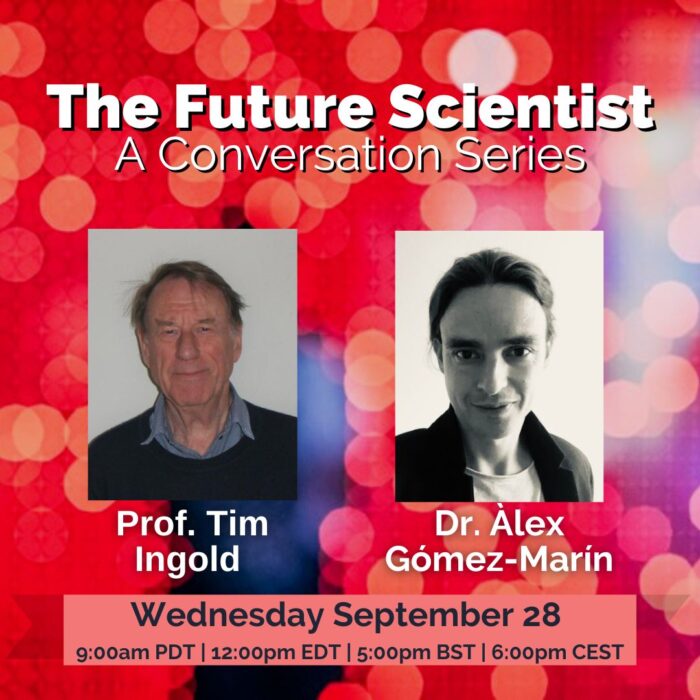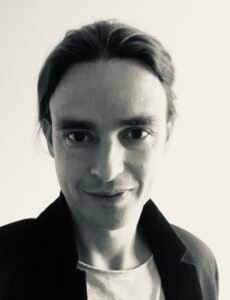Your cart is currently empty!

The Future Scientist – A Conversation with Tim Ingold
- This event has passed.
September 28, 2022 @ 6:00 pm – 7:30 pm CEST

A Conversation between Prof. Tim Ingold and Dr. Àlex Gómez-Marín
Wednesday September 28
9:00am PDT | 12:00pm EDT | 5:00pm BST | 6:00pm CEST
The session is live and all registered participants will receive the RECORDING.
A monthly virtual encounter to understand where science is going and to reimage where we hope it might go.
THIS EVENT IS FREE AND OPEN TO EVERYONE!
Join the event at the following link: https://us02web.zoom.us/j/82791503732
The dialogue will be in a lively and spontaneous format of approximately 45 minutes up to an hour and we will then open up for questions from the audience.
In the current zeitgeist of conjectural multiverses and promissory metaverses it has become increasingly hard to know what counts as real. Simultaneously, the dominant narrative insists on severing imagination from real life, as experts are urged to tell fact from fiction. In this instalment of The Future Scientist series we will join Prof. Ingold in his venture to heal the bifurcation between imagined and real worlds. After having tackled what he deems to be the central question of anthropology (namely, why people perceive their environments in different ways), the challenge now is, as he puts it, “to make allowance for imagination without reopening the gap between humanity and nature”. Completing a trilogy that started with The Perception of the Environment (2000) and Being Alive (2011), Ingold’s recent collection of essays entitled Imagining for Real (2022) masterfully merges relational, systems, and ecological thinking in order for imagination to join the real “instead of playing off against it”. Orbiting around “the inescapable condition of human existence in a world”, and highlighting the central role of creation, attention, and correspondence, Ingold gently but powerfully subverts the multi-, inter-, and trans-disciplinarily mantra and instead proposes a return to the perennial “love of learning” that The Future Scientist shall reenact.

Prof. Tim Ingold, FBA, FRSE, is Professor Emeritus of Social Anthropology at the University of Aberdeen. He has carried out fieldwork among Saami and Finnish people in Lapland, and has written on environment, technology and social organisation in the circumpolar North, on animals in human society, and on human ecology and evolutionary theory. His more recent work explores environmental perception and skilled practice. Ingold’s current interests lie on the interface between anthropology, archaeology, art and architecture. His recent books include The Perception of the Environment (2000), Lines (2007), Being Alive (2011), Making (2013), The Life of Lines (2015), Anthropology and/as Education (2018), Anthropology: Why it Matters (2018), Correspondences (2020) and Imagining For Real (2022).

Dr Àlex Gómez-Marín is a Spanish physicist turned neuroscientist. He holds a PhD in theoretical physics and a Masters in biophysics from the University of Barcelona. He was a research fellow at the EMBL-CRG Centre for Genomic Regulation and at the Champalimaud Center for the Unknown in Lisbon. His research spans from the origins of the arrow of time to the neurobiology of action-perception in flies, worms, mice, humans and robots. Since 2016 he is the head of the Behavior of Organisms Laboratory at the Instituto de Neurociencias in Alicante, where he is an Associate Professor of the Spanish Research Council. Combining high-resolution experiments, computational and theoretical biology, and continental philosophy, his latest research concentrates on real-life cognition and consciousness.
The Future Scientist Series
Science as we know it is a relatively recent human invention.
After the ‘scientific revolution’ of the seventeenth century, science and philosophy remained entangled as ‘natural philosophy’ until they started to separate in the nineteenth century (the very word ‘scientist’ was coined in 1834). Subsequently, science morphed from an activity carried out by wealthy people as a hobby (the ‘amateur,’ in the etymological sense of the word) into a paid job within an institutionalized system (the ‘professional’). Paradoxically or not, great ideas come more easily from people who are not paid to have them—it’s like forcing someone to be free, or compelling creativity by an act of will.
In the last decades, a series of technological and societal changes have further accelerated mutations of what it means to be a scientist; from the selection forces cast by neoliberalism on ‘scientific careers,’ to the kind of ‘science in the age of selfies’ that social media promotes. Scientists too are prey to the perverse dynamics of nowadays ‘attention economy.’ To understand what scientists do and why they do it, one must also understand the political and social contexts in which they live.
In addition, the rise of ‘big science’—initially in physics (particle physics and astronomy), and subsequently in life and mind sciences (genomics, and connectomics)—is reconfiguring the landscape typically inhabited by the romantic figure of the lone scientist receiving visions in dream-like states of consciousness and, eventually, advancing science in a stroke of genius. In turn, the idea of the scientist bred in the current academe is that of a diligent caffeinated deluxe technician as a part within the larger mechanism of research group army; a person trained exquisitely (and almost exclusively) on a research aspect, a specialist unable to keep track of what goes on beyond the narrow confines of his/her discipline. Young scientists are indeed trained to be good at following rules and procedures (explicit laboratory protocols, but also implicit codes of conduct and metaphysical commitments) but discouraged to learn to see when and how to transcend them.
In turn, the more recent promises of ‘big data’ and ‘artificial intelligence’ posit a near-future landscape where some of the core skills and tasks traditionally attributed to humans may be soon carried out by machines (or so the ‘scientific soteriologists’ claim). Algorithms are not just ingenious means to an end that require human intervention to imbue them with meaning, but are swiftly becoming ends in themselves, pretending they offer an automated unbiased interpretation of the data.
A re-appraisal of the habits of the modern scientist entails an ethical dimension as well: why do we treat animals as objects (as means, rather than ends in themselves), why do we study life in laboratories primarily by killing it, and why do we study life in laboratories in the first place? These questions also reflect on ecological considerations regarding our place in nature (humans in relationship with other animals, and other kingdoms of life) and our destruction of the planet. Francis Bacon’s prophetic vision of the Promethean scientist, so vividly captured in Mary Shelley’s Frankenstein, has become both a cautionary tale and an inspiration.
In addition, and despite the real ‘paradigm changes’ in physics at the beginning of the twentieth century, other branches of science such as biology and neuroscience remain under the spell of philosophical promissory materialism. Research facts are sold in tandem with covert metaphysical commitments. The objective-subjective divide still puzzles both scientists and the layperson. The mind-body problem remains to be solved (or dissolved).
In sum, the whole enterprise seems to be committed to suppressing broad thinkers, promoting academics that look more like corporate managers, PR mavericks and professional fund-raisers and less like scholars, who are asked to inhibit their interest in philosophy, and to cast suspicion on their fertile imagination. Dogma and habit are inhibiting free inquiry.
It is as if science as a whole is becoming less scientific.
In the face of this milieu of factors, in this series of online events we seek to reflect on what ‘the future scientist’ may look like. This is an ambitious exercise indeed, which goes beyond mere theoretical speculation. It is not unlikely that sooner than we think current science will be unrecognizable to most of us. The consequences for humanity writ large, not just for scientists themselves, are pressing.
The question at stake is whether by ‘future scientist’ we mean what scientists in the future are all likely to look like, or what a future better scientist might look like. In our conversations we will engage more in prescribing than in predicting, that is, we might begin by describing where science is going (prediction) to then describe where we hope science might go (prescription). Attempting the art of ‘dia-logos,’ we hope to express a creative voice that will enlighten the way of a new science in the twenty-first century.
The series will be direct conversations, that is, no formal presentation of the invited speaker but a kind of ‘thinking aloud’ in the mode of a dialogue between each guest and Àlex Gómez-Marín as the conversation host. The idea is to engage critically with various aspects of ‘the future scientist’ in a lively and spontaneous format for approximately 45 minutes to an hour, followed by comments and questions from the audience. Each conversation will take place virtually, on a Wednesday each month.
The invited speakers to The Future Scientist series are chosen not just as great interlocutors to discuss these issues, but also as exemplars and hints of what ‘the future scientist’ may actually look like here and now.
